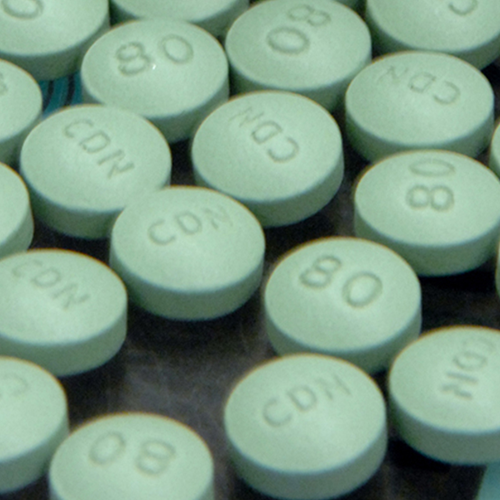

OxyContin is the brand name for a timed-release formula of oxycodone, an opioid analgesic pain medication. OxyContin is usually prescribed to relieve severe ongoing pain from arthritis, cancer, serious injuries, and other conditions, particularly in patients who have developed a tolerance to other opiate medications. OxyContin pills contain anywhere from 10 to 80 mg of oxycodone in a timed-release formula. This formula allows for up to 12 hours of relief from chronic pain. That long-lasting formula is what sets OxyContin apart from other oxycodone products.
The availability and high addictive potential of OxyContin has led to some rising issues. A 2010 study from the Substance Abuse and Mental Health Services Administration found that 182,748 emergency room visits that year had involved oxycodone products like OxyContin. The National Institute on Drug Abuse found that about 1 in 20 high school seniors reported abusing OxyContin.
Symptoms of Oxycontin Addiction
Symptoms of OxyContin Addiction
OxyContin works by attaching to opioid receptors, which proteins found on nerve cells in the spinal cord, brain, gastrointestinal tract, and other organs throughout your body. This creates those good feelings and relaxation. These opioids are generally mediated by other opioid receptors activated by the body’s own opioid chemicals. Unfortunately, constant, repeated drug use can inhibit the production of the body’s opioid chemicals, which can lead to withdrawals and addiction to the drug to not only eliminate withdrawals, but also give your body the chemicals that it would naturally need.
Some common OxyContin addiction signs include:
Taking more OxyContin than is prescribed; Taking OxyContin for its related high and not its prescribed purpose; Neglecting responsibilities; Legal and financial troubles stemming from OxyContin use; Reduced performance at work or school from OxyContin use; Fights, alienation, or generally strained relationships with friends and family
OxyContin Withdrawal Symptoms
Nausea and vomiting; Diarrhea; Insomnia; Stiffness and pain in the joints, bones, and muscles; Irritaility; Depression; Anxiety; Intense cravings
Effects of OxyContin Use
The Effects of OxyContin
OxyContin has the same effects as other opiate drugs, namely feelings of euphoria, calm, and complete relaxation that can help relieve chronic pain. Unlike other similar medications, OxyContin is designed to provide long-lasting relief.
- Cold sweats and chills
- Labored breathing
- Confusion
- Fever
- Tightness in the chest
- Dizziness, faintness, or lightheadedness
- Twitching
Dangers of Oxycontin Use
Those who abuse OxyContin tend to crush the tablets into a fine powder. They then snort the powder or mix it with water and inject it. Why the whole process? Crushing the tablet destroys the time-release part of the formula, giving the user the immediate, concentrated effects of the drug. This creates an even more intense high that many users compare to the same euphoria of heroin.
OxyContin also has a high lethal possibility. Even if you think you can take more, you’re still doing harm to your body. In high doses, OxyContin can lead to respiratory problems and potentially stop your breathing, especially when using alcohol or benzodiazepenes.
Complications of Oxycontin Use
- Stomach pains, nausea, or vomiting
- Swollen extremities
- Dry mouth or dehydration
- Increased urine volume
- Convulsions
- Chest pains
- Irregular heartbeat
- Tingling in your hands and feet

Medical Intervention for OxyContin Abuse
Medical Intervention
Medication is designed to rebalance the chemicals in your body, manage withdrawals, and curb cravings. For opiates like OxyContin, most doctors will recommend opiate receptor antagonists. These types of medications block the effects of opiates. One of the most popular OxyContin withdrawal treatment medication is methadone, which:
- Can be taken once a day
- Treat addiction without interrupting your day-to-day living
- Prevent the use of more illicit, dangerous drugs
- Helps to prevent relapse and overdose
OxyContin treatment is also often combined with various forms of counseling or therapy, including cognitive-behavioral therapy, family therapy, and contingency management.
RECOVERING FROM OXYCONTIN ADDICTION
The Road to Recovery
Detox sets a steady foundation for your recovery, but it’s just the first step. Most detox programs are the first part of or lead directly into longer rehabilitation programs. These rehabilitation programs offer more therapy and counseling along with tools, strategies, and personnel for long-term sobriety. The right detox program will give you the emotional and medical support needed to successfully detox and set yourself up for success in a rehabilitation program.

Find the Right OxyContin Detox Center for You
Georgia Drug Detox can help you find an inpatient care facility for your personal needs. Contact us if you have questions about treatment options, the process, or insurance. If you’re ready to commit to a new, clean life, call us at (678) 771-6411 and begin the admission process.

